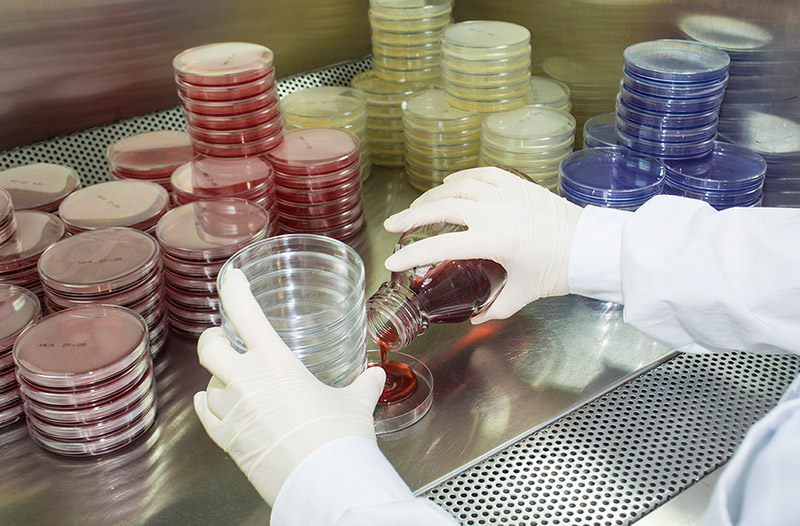Microbiological Testing for Pharmaceuticals
QACS laboratory provides a comprehensive range of microbiological testing services to support the pharmaceutical industry. Services ensure product safety and compliance with regulatory standards by offering rigorous testing for pathogens and objectionable microorganisms. We use validated methods and adhere to global standards, including USP, EP, and JP, to ensure precision and reliability in every test.
Microbiological Pharma Testing services from QACS Lab extend beyond routine analysis to include customized studies for method validation, preservative efficacy, and stability testing. We also offer environmental monitoring services tailored to pharmaceutical manufacturing environments, ensuring your facility meets GMP compliance through regular assessments and risk management solutions.
We ensure Quality & Safety of pharmaceutical products, raw materials and water (PW, WFI) at every stage of the production process by conducting Microbial Enumeration Tests (Total Aerobic Microbial Count, Total Yeast and Mold Count) and Screening for objectionable microorganisms, using compendial methods such as USP, EP, and JP.
Our testing helps ensure that your raw materials meet stringent quality standards, minimizing the risk of contamination and ensuring the safety of the final product. Key services include:
- EP 2.6.12 & USP <61> Microbial Enumeration Tests: Includes Total Aerobic Microbial Count (TAMC) and Total Yeast and Mold Count (TYMC).
- EP 2.6.13 & USP <62> Tests for Specified Organisms: Detection of specific microorganisms such as Escherichia coli, Staphylococcus aureus, Pseudomonas aeruginosa and Salmonella,
- USP <60> Burkholderia cepacia Complex Testing: Ensuring non-sterile products meet safety standards.
- Probiotic Testing (USP <64>): Comprehensive testing for probiotic products to ensure viability and safety.
- USP <2021> & USP <2022>: Microbial Enumeration and Detection testing of nutritional and dietary supplements, intended to verify the absence of aerobic microbial count and specific pathogens.
QACS offers comprehensive pathogen testing and microbial identification services, under GMP certification to detect and eliminate harmful microorganisms in pharmaceutical products.
Our advanced identification methods with molecular techniques (Real time PCR – 16s sequencing) help pinpoint potential contaminants, ensuring your products are free from pathogens like Enterobacter gergoviae, Burkholderia cepacia, Escherichia coli, Pseudomonas aeruginosa or other objectionable microorganisms.
Additionally, we identify objectionable microorganisms that could impact product quality or safety. With cutting-edge technology (Next Generation Sequencing) and expertise, we provide rapid (within 48hours) and accurate results for identification of both bacteria and moulds to support your quality control programs, environmental monitoring or other needs.
We offer micro suitability testing services as part of our method validation process, ensuring that microbiological methods are suitable for testing your specific products.
These preparatory tests are critical for validating methods for sterility testing, microbial limits testing, and pathogen detection. Our experts collaborate with you to tailor validation studies that align with GMP regulations and meet regulatory requirements, ensuring your testing methods are robust and reliable.
preservatives in your pharmaceutical and personal care products. Following Εur. Pharmacopoeia 5.1.3 or USP <51> guidelines, we assess the ability of your preservative system to prevent microbial growth over the product’s shelf life. Preservative Efficacy Testing (PET) properties are adequate when there is a significant drop or no increase of micro-organisms in the inoculated preparation at prescribed temperatures and time specific conditions. This testing is crucial for products like creams, ointments, and liquid preparations, where microbial contamination could compromise safety and efficacy.
Trust QACS to provide thorough and compliant preservative efficacy testing to support your product’s stability and safety. Key Protocols to assess the efficacy of preservatives in pharmaceutical products:
- EP 5.1.3 Efficacy of Antimicrobial Preservation
- USP <51> Antimicrobial Effectiveness Testing
Our Environmental Monitoring Program (EMP) services ensure your manufacturing environment remains compliant with GMP standards.
We offer regular testing of air, surfaces, and water systems to detect microbial contamination, as well as environmental swab analysis for specific microorganisms. Our EMP services help identify and mitigate potential contamination risks, ensuring a sterile and controlled production environment that complies with regulatory requirements. We work closely with you to design an EMP tailored to your facility’s needs, supporting ongoing GMP compliance.
At QACS, we offer specialized testing services tailored to the stringent requirements of ophthalmic products packed in multi-dose closing tip system which avoids the need for preservatives, to ensure their safety and efficacy. Our expertise includes comprehensive testing such as the:
- In-Use Worst Case Dynamic Microbial Challenge Test for packaging systems. This critical study provides documented evidence that preservative-free ophthalmic products, even under extreme conditions, can protect the first dose delivered and prevent contamination of the product’s contents.
We test various containers to ensure repeatability and use single-strain or multi-strain suspensions of microorganisms commonly associated with eye infections or human flora contaminants. The study’s design is tailored per product, based on the product’s shelf life and dosage scheme. This study is crucial to confirm that the closing system maintains product integrity throughout its shelf life and dosage scheme.
- Efficacy studies to substantiate that the closing system does not promote biofilm formation. Microbiological challenge study ensures that ophthalmic products packed in multi-dose closing tip system do not promote biofilm development on the nozzle’s surface. Such studies evaluates the nozzle tip’s exposure to static biofilms using frequently reported biofilm-forming bacteria and are prerequisite for registry of such products.
Microbiological Testing
For Pharmaceutical Microbiology Testing contact us – [email protected] – +30 210 29 34745

